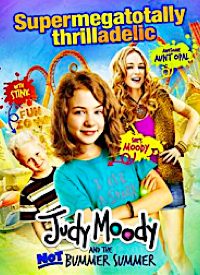
Judy Moody (Jordana Beatty) is a third grader who has set out to ensure that this summer is the most exciting summer she has ever experienced. Judy constructs the “Judy Moody Mega Rare Not Bummer Summer Dare Chart” wherein she and her friends are to tally their summer adventures.
Judy’s plans are dampened, however, when she learns that her best friend Rocky is to go to a Circus Camp for the summer, and her friend Amy is off to Borneo to assist a lost tribe.
Meanwhile, Judy’s parents announce that they will be in California for much of the summer to take care of her grandfather.
With her parents away, and her two best friends gone for the summer, Judy and her little brother Stink (Parris Mostellar) are stuck with Aunt Opal (Heather Graham), who is a bit eccentric. However, Judy remains undeterred in her quest for the most thrilling summer of her life.
Competing with Rocky and Amy for thrill points, Judy’s goal is not an easy one, but she has a plan: She will imitate the adventures of her friends at home, which requires a great deal of imagination on her part.
While Stink sets out to discover Bigfoot, Judy elects to pursue a series of adventures that are nothing short of disasters, with her oft-frightened buddy Frank (Preston Bailey), which includes an over-the-top car chase.
Unfortunately, much of the humor in Judy Moody can be classified as potty humor, with jokes regarding food, fecal matter, and vomit. The humor in the film seems geared towards extremely young audiences, as much of the mischief borders on absurd and silly.
Judy is a pleasure to watch on screen, a wild-haired child with a tomboy’s courage and an ability to make innocent trouble wherever she goes. Though a newcomer to the screen, Beatty’s portrayal of Moody is apt, with just the right amount of wackiness to bring the story to life on screen.
At times, the film does become a bit chaotic, which will likely keep young audiences engaged but may serve to exhaust older audiences.
Overall, the film is quirky and can be relatable to many of the younger audiences. In fact, unlike other children’s films like the Shrek and Toy Story series, which include humor for adults, Judy Moody’s humor is limited solely to children. For some, this may make it difficult to enjoy, but others may delight in being taken into a strictly child’s world. The plot is highly creative, with a great script, and includes positive elements, though it does not bear the usual moral lessons that one would find in a film of this nature.
Judy does, however, learn an important lesson: Rather than competing with her friends for thrill points, which has often resulted in a moody and agitated Judy Moody, she should simply allow herself to just enjoy her summer.




